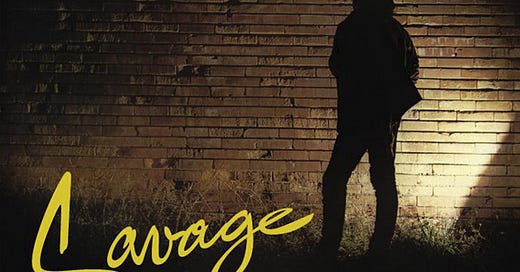Genre of the Day - Italo-Disco
Album of the Day - Tonight by Savage (1984)
Though it’s wonderful to be able to learn about the world’s musical breadth, this column certainly skews towards the jack-of-all-trades mode of learning rather than mastering my knowledge of any one particular musical sphere. There’s so much beauty in the way that each musical tradition is so divergent and reveals something intimate about some facet of the human experience, emotion, specificity, epoch-specific perceptions. However, the upcoming prospect of traveling abroad to Italy in my life offers the exciting contrast of being able to more comprehensively delve into a particular place’s traditions, and landing on today’s genre reminds me of that. The other day that I covered jerk rap, I touched on my chance conversation with the producer Desmos, who among many other tidbits divulged that there’s a ton of Italian producers locked into the American rap underground from thousands of miles away. I recently came across the excellent Substack Italian Disco Stories, an excellent deep-dive into a particular scene that made an outsized mark on dance music’s history since. There’s evidently a lot to know about the boot.
We make our return to the disco dance floor after Kylie Minogue raised the heat with nu disco, shifting back to a time closer to the genre’s original heyday as it mutated internationally into new forms. Italians already had engraved a defining groove into disco’s fundamental disk thanks to the pioneering efforts of Giorgio Moroder, the Moog moonwalker whose compositions like Donna Summer’s “I Feel Love” helped unleash the power of the synthesizer. Upon picking up that particular record, fellow visionary Brian Eno correctly suggested that it would launch the sound of dance music rocketing into the future. Though Moroder made the song in Munich and Kraftwerk’s influence is apparent, perhaps there was still an unspoken Italianism about the sound, as other producers in Europe began to notice that the disco coming out of Italy sounded like dance music for cyborgs rather than your typical human discogoers. The space disco craze had recently come to pass, but Italo-disco dispensed with the strings and lushness present in that futuristic vision for something more syncopated and icy.
Local specificity did not translate to a desire to be insular, as Italo-disco sought to internationalize their dance floor through singing in English. To be blunt, though, English proficiency has never been Italy’s forte, and it’s still among the lowest in Europe. The lyrics produced are thus heavy-handed in their grammatical clumsiness and focused on the starkest dancefloor motifs in love, longing, and the joys of partying. Italo-disco simultaneously sells and spoofs a dream, often drawing aesthetically and lyrically on mythic visions of the romantic Italy and the riviera packaged for and sold to tourists and urban Italians alike. There’s tension between that self-representation and the actual frigidity of the music, hyper-fixated on a futuristic ambience concocted via strong, unrelenting drum machine beats and waves of synths; gone is the string warmth of American disco. There’s a strong internal conformity that defines Italo-disco and makes it instantly recognizable—these records stood out in their replicability, a generation of weary Italians giving in to that mass hedonism rather than resignation.
Savage’s 1984 Tonight opens with “Radio,” and the hallmarks are not hard to listen for—the drums are brash and the staccato synth plucks jump out of the recording, but it’s the insistently hammering beat that stands as the greatest testament to the massive shadow Italo-disco casts on continued waves of synth-pop. There’s a hard-edged melancholy throughout, distilling danger in a distinct manner from the emotional flames that lick American disco, such as in the creeping arpeggios and rich movements of “Tonight.” The strength of these instrumental settings also serves to distract from the lyrics, which genuinely cause one to wonder about the songwriting process and what English sources Savage plucked from for these pretty, nonsensical arrays of words as in “Don’t Cry Tonight:” “As you're hangin' upon me, do you love melody? / Thief of golden toys to an upset time away /As you have been at last we have the melody, we too.” It’s one of many beguiling abstractions that Italo-disco represents; it’s dance music as surrender to mystery.





Great episode on a genre that is a prominent part of the scope of the newsletter I write every week, "The Twelve Inch." You're absolutely right—the unique style of English in Italo disco is quite remarkable 😁. The goal was to make it "sound good" probably, rather than to make perfect sense. But there's a deeper connection between Italo disco and American disco. The Italian diaspora in the US and Canada played a significant role in the later stages of (American) disco's development. The rise of electronic instruments made disco production more affordable, and the genre's popularity drew in countless producers. As a result, cost-effective options thrived. Italy became the most crucial market for disco in Europe. If you search for obscure disco records today on sites like Discogs, you'll often find that the Italian pressing is the only European version available. Unlike in the US, where the 1979 "disco sucks" backlash pushed the genre underground, disco never faced such a decline in Europe. Italians kept the momentum going, and Italo disco offers a glimpse into what American disco might have evolved into if the Comiskey Park riots had never occurred.